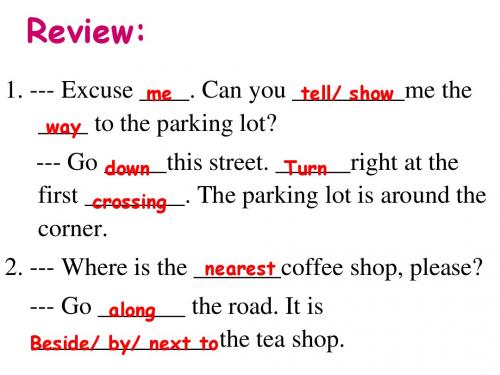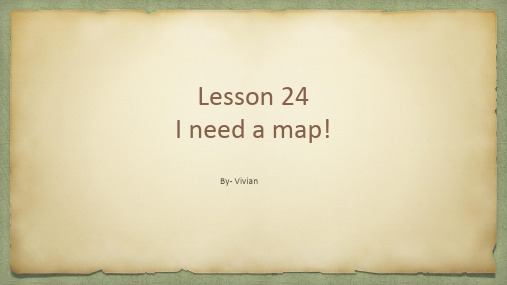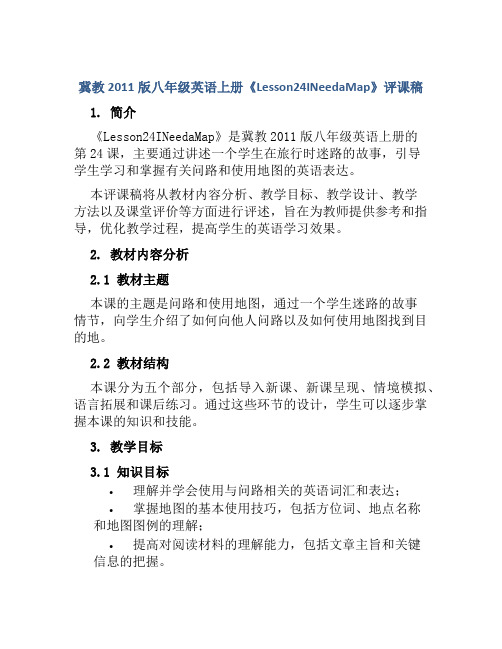冀教版英语八年级上学期 Lesson 24 I Need a Map! 课后练习(含答案)
- 格式:docx
- 大小:21.12 KB
- 文档页数:4

Lesson 24 I Need a Map!同步练习基础强化一、根据句意及汉语提示填写单词。
1. ________ (幸运地), we won the first prize in the competition.2. I am doing very ________ (好地).3. Jenny and I ________ (步行)to school on Monday.4. She ________ (出示) her favourite places to me.5. Tomorrow I’m going to ask Uncle David to ________ (买) me a map.6. Thanksgiving was a lot of ________ (趣味).7. I met all of my ________ (加拿大的) cousins.8. I will be glad when you ________ (来) to Canada, too.二、根据句意用所给词的适当形式填空。
1. Jack, can you swim ______ (cross) the river?2.—You seem to get _______ (lose). Need help?—Yes, I’m looking for the bus stop.3. They drove 60 ______ (mile) through the forest.4. Tom ________ (have) the flu last Sunday. So he didn’t go to the party.5. I lost my ticket, but ________ (lucky) the travel agent gave me another one.三、用适当的介词填空1. 书店在超市的对面。






Unit 4 My NeighbourhoodLesson 24 I Need a Map!一、根据句意及首字母或汉语提示完成单词1.I got (感冒) twice last month.2.After walking for (英里), I was tired.3.The ship sailed (横过) the Atlantic.4.The Children’s Hospital is just a from the movie theatre.二、用所给词的适当形式填空1.My mother often gets (lose)in big cities.2.At the second (cross)you can turn left.3.Turn right after you pass the (five)building.4.Danny has already (write)the way to the movie theatre.5.I have to tell you that I (have) the flu.6. (lucky), I found my lost bike.三、选出与画线部分意思相同或相近的选项1.It’s twelve o’clock, and Jenny is walking down the road.A.alongB.forC.inD.at2.Yesterday he went to the funny town, but he got lost when he was back.A.be lostB.were lostC.was lostD.is lost3.At the third crossing you will find the movie companies.A.acrossB.acrossingC.turnD.turning答案一、1. flues3.across4.across二、1. lost2.crossing3.fifth4.written5.have6.Luckily三、1. A2. C3. D。





冀教2011版八年级英语上册《Lesson24INeedaMap》评课稿1. 简介《Lesson24INeedaMap》是冀教2011版八年级英语上册的第24课,主要通过讲述一个学生在旅行时迷路的故事,引导学生学习和掌握有关问路和使用地图的英语表达。
本评课稿将从教材内容分析、教学目标、教学设计、教学方法以及课堂评价等方面进行评述,旨在为教师提供参考和指导,优化教学过程,提高学生的英语学习效果。
2. 教材内容分析2.1 教材主题本课的主题是问路和使用地图,通过一个学生迷路的故事情节,向学生介绍了如何向他人问路以及如何使用地图找到目的地。
2.2 教材结构本课分为五个部分,包括导入新课、新课呈现、情境模拟、语言拓展和课后练习。
通过这些环节的设计,学生可以逐步掌握本课的知识和技能。
3. 教学目标3.1 知识目标•理解并学会使用与问路相关的英语词汇和表达;•掌握地图的基本使用技巧,包括方位词、地点名称和地图图例的理解;•提高对阅读材料的理解能力,包括文章主旨和关键信息的把握。
3.2 能力目标•培养学生的英语听说能力,特别是与问路和使用地图相关的交际技能;•培养学生的阅读理解能力,特别是从阅读材料中获取信息的技巧;•培养学生的团队合作意识和表达能力,通过情境模拟激发学生的英语实际运用能力。
4. 教学设计4.1 教学重点•掌握与问路和使用地图相关的英语词汇和表达;•学会使用地图图例和方位词,有效获取所需信息。
4.2 教学难点•如何熟练运用所学的英语词汇和表达进行实际情境对话;•如何使用地图图例和方位词准确查找目的地。
4.3 教学过程4.3.1 导入新课1.引入学生:让学生回想一下在旅行或陌生地点迷路的经历,并分享一些有趣的故事。
通过与学生的互动,引发学生对本节课内容的兴趣。
2.导入话题:利用图片或实物展示地图,并和学生一起讨论地图的作用和重要性。
引导学生思考在陌生地方如何方便快速地找到目的地。
4.3.2 新课呈现1.向学生介绍新词汇:教师利用图片、实物或多媒体展示相关单词和短语,引导学生正确发音和记忆。


Lesson 24 I Need a Map!一、语篇研读What:本课的教学内容是第四单元的第六课时,以Brian 给家人写信为主线,介绍了他生活中的一些经历,学生通过本课的学习不但能够了解Brian 的经历,并且还能够运用所学知识去简单介绍自己的经历。
学生通过英语课程能够开阔视野,丰富生活经历,形成跨文化意识,增强爱国主义精神,发展创新能力,形成良好的品格和正确的人生观与价值观。
Why:因为在现实生活情境中对自己经历的描述以及学会指路和问路的表达会帮助学生更好的促进彼此的了解,学会正确的介绍自己和他人的经历也是基本交际能力,培养语言表达技能,同时学习在新情境中运用相关知识和技能来提高自己适应社会的能力。
How:本课的语篇内容是学生学会如何描述生活中的一些经历,并采用自述的方式进行,准确的表达了自己的生活经历.同时涉及到指路和问路的表达方式,这部分还包含了描述社区的一些主要词汇,如barkery,bookstore,park,flu,mile,across等,涉及的短语,比如:across from,go by等。
以及可以复习询问问路和指路的语言表达,如:Can you tell me the way to the movie theatre?Go down this street,turn right at the second crossing. The movie theatre is on your left.二、教学目标通过本课的学习,学生能够:1、能够掌握课标要求的词汇:flu、mile、across等,并获取社区的简单表达。
2、获取Brian的一些生活经历,并学会谈论居民区里人们问路与指路的方式。
3.掌握本课主要语法知识点,运用相关的语言表达方式,并学会运用所学词汇和句型介绍自己或他人生活中的一些经历。
三、教学过程【教学目标】1.能够掌握课标要求的词汇:flu、mile、across等,并获取社区的简单表达。

Lesson 24: I Need a Map!【认知学习目标】:1.识记课后单词:flu,mile,across.2.掌握句型短语:across from; have the flu;I'm doing well;get to know;go by;a lot of fun;It’s +形容词+to do sth..3.理解课文大意,能准确地用不同时态来表达不同的句子。
【预习成果展示】1.get(过去式)_____2.cross(名词/介词)________3.luck(形/副)______ /_______4.不得不____________5.患流感______________6.逐渐了解/熟悉_____________7.在对面_________________8.经过_____________9.非常有意思_______________【课堂学习研讨】Step1.Learn new words and explain some of them.Step2.Read the text carefully,then finish follow ing questions: (Let’s do it: No.1)nguage points.(师生合作找出下面句子中的语言点)1.I’m doing well.2.I have to tell you that I had the flu.3.This week, I got to know my neighbourhood.4.Across from the bookstore, there’s a beautiful park.5.Tomorrow I’m going to buy a map of the city because I don’t want to get lost again.【当堂训练检测】Ⅰ.用所给词的适当形式填空:1.Our school is only 3__________(mile) from Tom’s home.2.____________(luck), he was not hurt badly.3.I’m doing very ___________(good).4. We have fun _______(play) chess together in the evening.5.There is a bakery ______(cross) from my school.6.Is it easy___________(live) in a new place?7. I want to see her ______ she is ill. (because/ when / so / why)II.句型转换:1.I ______ Ms. Liu very well. I ________ her five years ago.(汉译英)我很了解刘女士,我五年前就认识她了。

Lesson 24 I need a map一,教材分析1.单元及课文分析本单元的日常用语主要围绕“社区生活〞为话题。
教材为学生提供日常生活中“社区生活〞的场景,帮助学生学习理解并掌握社区生活的英语表达方式。
在教学过程中,教师应创设“社区生活〞的情景,围绕这一话题谈论社区里不同职业的人们不同的生活方式。
二..教学目标1.语言知识〔1〕掌握词汇:flu, miles,(2)短语及句型:have the flu, across from,get lost2.语言技能掌握指路句型,并能谈论居民区里人们问路与指路的方式。
情感态度采取小组活动和评价的形式,加强学生的合作意识。
三教学重点:学习有关指路的新单词,稳固和扩充学生的词汇。
教学难点:利用所学词汇描述自己的居民区的人们问路与指路的方式。
四.教学步骤Step anizationFirst the teacher greets students “ Good morningStep2. Warming upShow some pictures about the a baby and learn some new words.Step 3.Listen and answerPlease listen to the tape carefully and answer the following questions.(T or F )1.Brian had the flu.( )2. The school is two miles from Uncle David’s home.( )听的环节是“输入〞的过程,带着问题听,让学生在听的过程中有的放矢,有效捕捉信息,同时又提醒学生注意观察并发现需要注意的表达方式,为后面的语言实践准备实用句型。
这种让学生在具体的语境中发现新句型的教学方法,能有效地提高学生分析问题和解决问题的能力,防止了传统的教师为主体的抽象的语法说教,调动了学生思维积极性,给学生提供了提高观察能力,分析能力和归纳总结能力的开展平台。
Lesson 24I Need a Map! 课后练习
Ⅰ.用括号内所给单词的适当形式填空
1.Walk (cross) the road, and you’ll find the bank on your left.
2.It is two (mile) away from the town to my house.
3.Yesterday my grandmother (have) the flu.
4.(luck), the old man caught the last bus.
5.My sister is doing (good) these days.
Ⅱ.用方框中所给短语的适当形式填空
6. When he the bank, he found many people in it.
7.the park is a post office.
8. My grandfather often when he comes to see me in the city.
9. Playing games with Danny is.
10. Don’t worry. I’ll my new classmates soon.
()11. When you swim the river, you must be careful.
A.across
B.below
C.over
D.through
()12.—Did you call Michael back?
—I didn’t need to, I’ll see him tomorrow.
A.and
B.because
C.if
D.so
()13.—does she live?
—She lives across from Xinhua Hotel, in the same neighbourhood as me.
A.What
B.Where
C.Which
D.What time
()14.Peter and his sister go by a big restaurant on way to school every day.
A.my
B.her
C.his
D.their
()15.A kind woman me the way to the museum. I arrived there on time.
A.showed
B.said
C.passed
D.travelled
Ⅳ.阅读理解
Most of Tom’s neighbours were friendly. They were always ready to help each other when they were in trouble. But everyone hated one woman because she was always borrowing things from her neighbours but forgetting to give them back.
One morning, Tom heard a knock(敲) at his front door, and when he opened the door he found this woman outside.
“Good morning, Tom!I have to take some things to my sister in town today, but I haven’t got a horse, as you know. Will you lend me your horse? I will bring it back this evening.”
“I’m sorry,”answered Tom. “If my horse was here, I would lend it to you, but it isn’t.”
“Oh?”said the woman. “It was here last night because I saw it under the tree in your garden. Where is it now?”
“My wife took it to town early this morning,”answered Tom.
Just then the horse made a big noise.
“You’re not telling the truth, Tom!”the woman said angrily. “I can hear your horse. You should tell the truth to your neighbour.”
“Sure!”said Tom. “Is it good manners(礼仪) to believe a horse’s word rather than(而不是) that of your own neighbour?”
The woman left without a word.
()16.How were most of Tom’s neighbours?
A.They were impolite.
B.They were friendly.
C.They were unfriendly.
D.They were in trouble.
()17.When did the woman knock at Tom’s door?
A.One morning.
B.One noon.
C.One afternoon.
D.One evening.
()18.What did the woman want to do?
A.She wanted to return something.
B.She was looking for her own horse.
C.She wanted to see Tom.
D.She wanted to borrow Tom’s horse.
()19.Why did the woman become angry?
A.Because Tom didn’t let her in.
B.Because Tom’s wife took the horse to town.
C.Because Tom didn’t tell her the truth.
D.Because her horse was missing.
()20.What can we infer(推断) from the passage?
A.Tom lent his horse to the woman.
B.Tom didn’t lend his horse to the woman.
C.Tom’s horse was not at home then.
D.The woman told a lie(谎言).
参考答案
Ⅰ.1.across es 3.had
4.Luckily
5.well
Ⅱ.6.went past7.Across from8.gets lost
9.a lot of fun10.get to know
Ⅲ.11.A句意:当你游过这条河时一定要小心。
across意为“横过”,指从表面穿过。
故选A。
12.B句意:“你给迈克尔回电话了吗?”“我不需要回,因为明天我将会看见他。
”and意为“和,与”;because意为“因为”;if意为“如果”;so意为“因此,所以”。
横线后面是不需要回电话的原因。
故选B。
13.B14.D15.A
Ⅳ.16.B17.A18.D
19.C女人听到马叫,知道汤姆在说谎,因此感到很生气,故选C。
20.B根据前面汤姆借口马不在家,到后来这个女人听到马的叫声,再由汤姆说的话,可以确定他不会借马给她。
故选B。